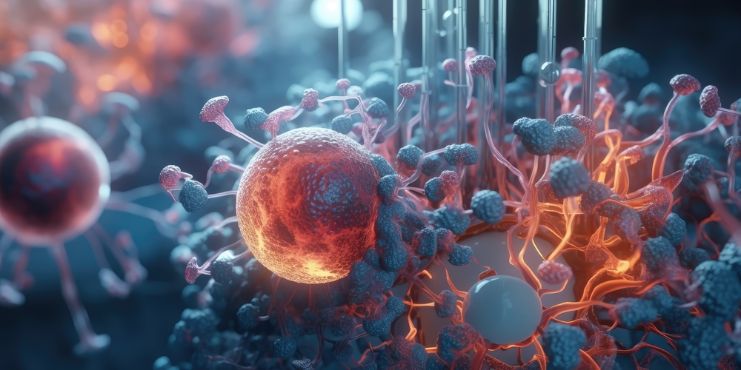Follicular lymphoma is a type of non-Hodgkin lymphoma that grows in cells in the lymphatic system. These are the tubes that carry a colourless liquid called lymph (blood) around our body tissues, carrying white blood cells (lymphocytes) that fight infection. These cells grow together in clumps to form lymph nodes – hence the name. Follicular lymphoma starts in B cells and is therefore a type of B cell non-Hodgkin lymphoma.
The earliest symptoms are painless swelling (enlargement) of one or more lymph nodes, especially in the neck, armpit or groin area. These nodules may be present for a long time before being noticed, and their size can increase and decrease over time. Occasionally, these tumors can grow to such an extent that they block the flow of fluid or of an organ such as the digestive tract, urinary bladder or blood vessels. This is when treatment becomes necessary.
Most people with follicular lymphoma have advanced-stage disease at the time of diagnosis. While these cancers are not curable, most people with follicular lymphoma achieve long periods of remission between courses of chemotherapy. However, it is a cancer that tends to come back (relapse) and most people will require further treatment at some point in their lives.
Research into new treatments for this type of non-Hodgkin lymphoma continues. Many targeted therapies are being tested in clinical trials, including some treatments that work by helping your immune system to fight the lymphoma and are not chemotherapy drugs. Some of these therapies are already available to treat other types of lymphoma.

Your medical team will determine whether you need treatment right away and what treatment is best for you, depending on the stage of your follicular lymphoma. This will involve taking into account any signs or symptoms you have, as well as how the lymphoma has progressed. The doctors will also look at your age, gender and ethnicity, as these factors can influence how likely you are to develop this type of lymphoma.
You will have a blood test to check your white blood cell count and to see how your liver and kidneys are working. These tests will help your doctor to decide which chemotherapy drugs you need to take. These drugs will be given intravenously in cycles. Each cycle lasts four weeks and consists of one week of treatment followed by two weeks off the drugs. The most common regiments used to treat follicular lymphoma are R-CVP (rituximab, cyclophosphamide, vincristine and prednisone) or R-CHOP (cyclophosphamide, vincristine, adriamycin and prednisone).
Sometimes it is possible for the follicular lymphoma to be cured with radiation therapy alone. This is more common in people with stage I follicular lymphoma, but can also be effective in some people with stage II or III disease. However, the majority of people with follicular lymphoma need other forms of treatment to control the growth of the lymphoma and to prevent it from coming back (relapse). The aim is to improve quality of life for as long as possible.








